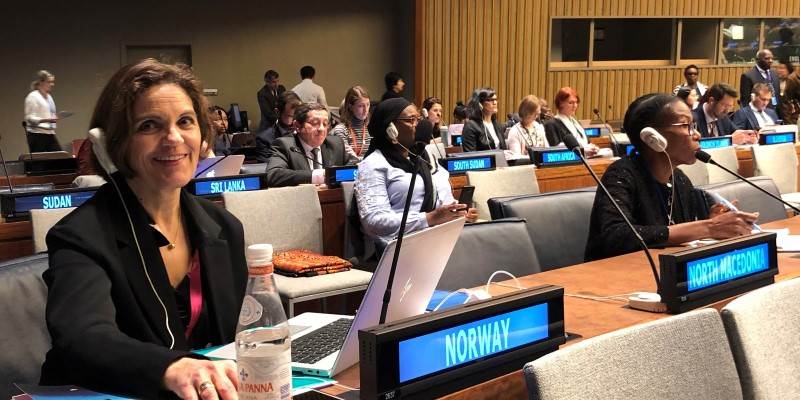Thank you,
I would like to thank you, on behalf of the UN-Economic Commission for Europe and its Standing Working Group on Ageing, for the opportunity to present our work for you.
The Working Group is chaired by Portugal, and, on behalf of Norway, I am it's vice-chair.
I would like to share with you some highlights of the achievements over the past years as well as our work ahead.
We have over the years, developed a method of working across the region, that can relate to the goals of the Open Ended Working Group.
The Standing Working Group on Ageing seeks to improve policymaking among the ECE Member States, to fulfil the policy principles of the (2002) Madrid International Plan of Action on Ageing (MIPAA) and its Regional Implementation Strategy (RIS)
Last year it celebrated its 10th anniversary and this year the Excom of the UNECE promoted the working group to a standing working group.
It is constituted by national focal points, representatives of NGO's and a Bureau. It meets every year.
It aims to foster international exchange and support in developing national policies on ageing.
A ministerial conference is held every fifth year. For the 2017 meeting in Lisbon, the working group acted as a preparatory committe.
The Lisbon Ministerial Declaration, A sustainable society for all ages, is now setting priorites for our work for this period 2017-2022. The main themes of the declaration are:
- Recognizing the potential of older persons
- Encouraging longer working life and ability to work
- Ensuring ageing with dignity
These goals are an expression of how ageing policy and the concept of active ageing is evolving to a more comprehensive and cross-sectorial approach.
The Working Group aims to evoke the opportunities of longer life and more older people, instead of seeing ageing solely as a challenge and a burden. To increase participation of older people in our socities is a benefit for their quality of life, as well as for future welfare.
As a new initiative, the Working Group of Ageing held a policy seminar on how we can connect ageing issues and the implementation of the Lisbon declaration to the 2030 Agenda, for a more coherent policy.
We need to be more aware of how ageing is related to many of the SDG's, and how national ageing policies are important to reach the SDG-goals.
In the policy seminar, countries like Armenia and Austria, gave good country exemples,
We used a scheme that guided us in how we can can integrate ageing in the national implementation of the SDG's.
Capacity building is a fundamental and continuous part of our work:
We have elaborated over 20 policy briefs: Last year, we made a paper on Innovative social services and supportive measures for independent living in advanced age
And another on combatting ageism in the world of work
And we support member states on developing national strategies on ageing:
Last year, upon request of Belarus, a field mission was carried out to develop a road map for a national strategy.
The Working Group also provide tools for monitoring ageing policies, which is equally of great value for MS.
The Active Ageing Index, which is financed by the European Union, shows the development and untapped potential of national ageing policies, based on a cross-sectorial index, based on harmonized data. It measures the level to which older people live independent lives, participate in paid employment and social acitivities, and their capacity to age actively.
It is important to note that even "high-score" countries have a way to go.
The Generations and Gender Programme provides data on intergenerational transfers and relations.
The Working Group on Ageing takes part in the Programme of Action of the International Conference on Population and Development (ICPD) and participated in the Regional review and conference in October, and provided useful background information for the Conference.
Population ageing as the core trend in the region, was underlined in the ICPD Conference. Possibilities to harness the potential of older persons were looked into.
For the work ahead, the working group will continue the success with the policy seminar on ageing
On the initiative of Portugal, we will develop guidelines on mainstreaming ageing, for inspiration and exemples on how ageing issues can be integrated in policies across sectors.
We will work on two more policy briefs. One on informal carers and one on ageing in urban environments.
We will work with Belarus and Kazakhstan on road maps on ageing
We will continue to provide monitoring tools and evidence building
I would like to emphasize the role the UNECE-Standing Working Group on Ageing plays in facilitating collaboration with international organizations and stakeholders involved in ageing issues. The reports and up-dated information that are presented from different organizations at the annual meeting, are very useful for the national focal points.
To conclude, let me mention that now over 10 years in operation, the UNECE Standing Working Group has proven its value added.
The impact of population ageing is increasingly felt in our societies. Member states continue to express commitment and engagement. It provides a very valuable platform for exchange on ageing-related policies.
I hope our experiences can be useful input on implementation of ageing policies, for the Open Ended Working Group on Ageing.
On behalf of the UNECE Standing Working Group on Ageing, we appreciate to take part in this important forum on ageing, and to be inspired by the work from other regions.
I wish you, Madam Chair, a successful meeting.
Thank you for your attention.
